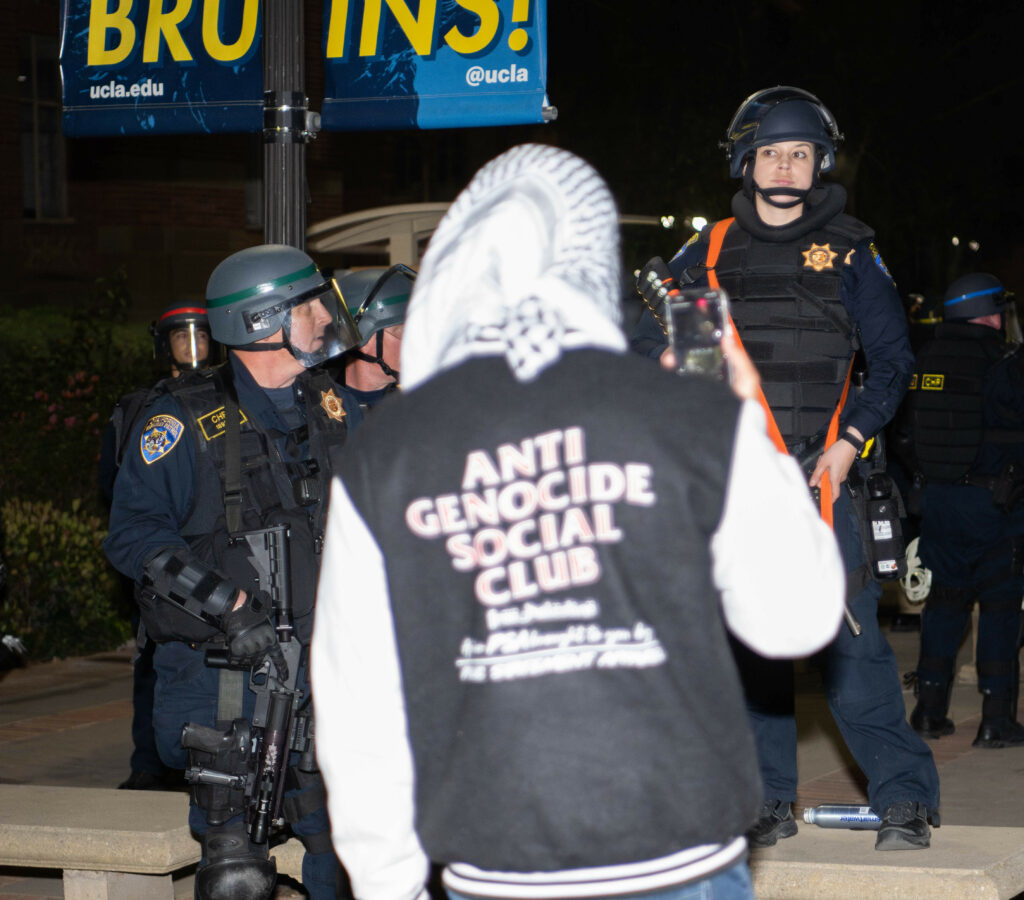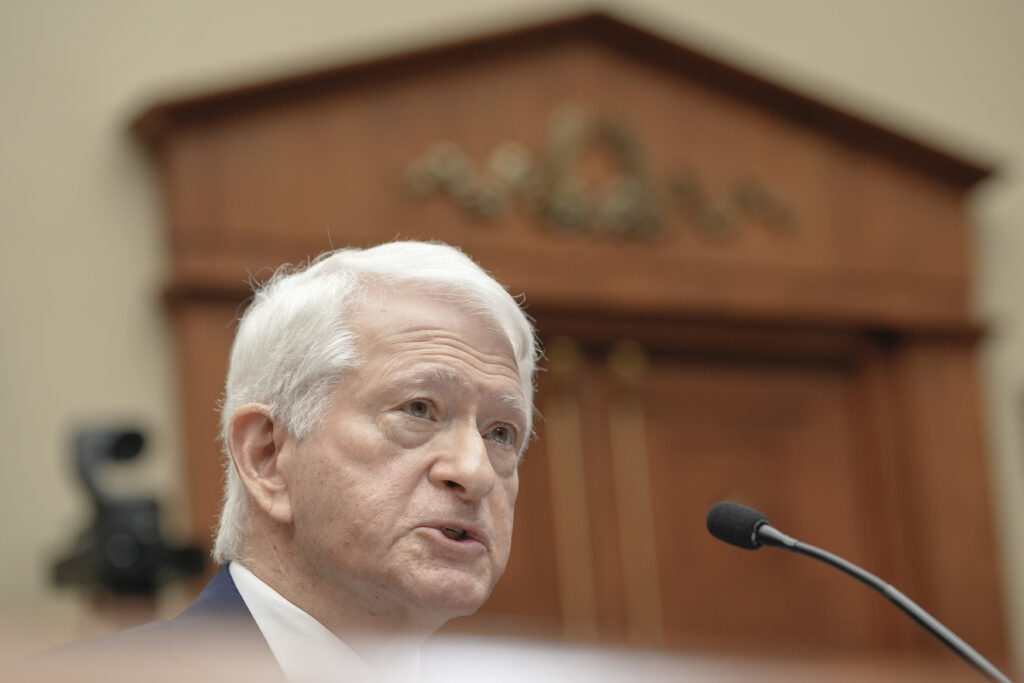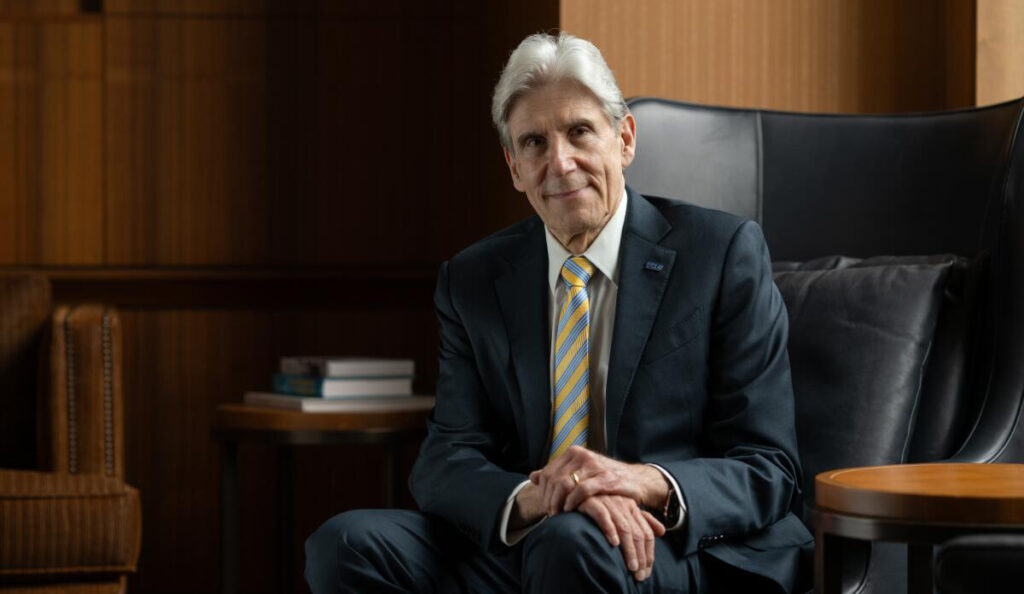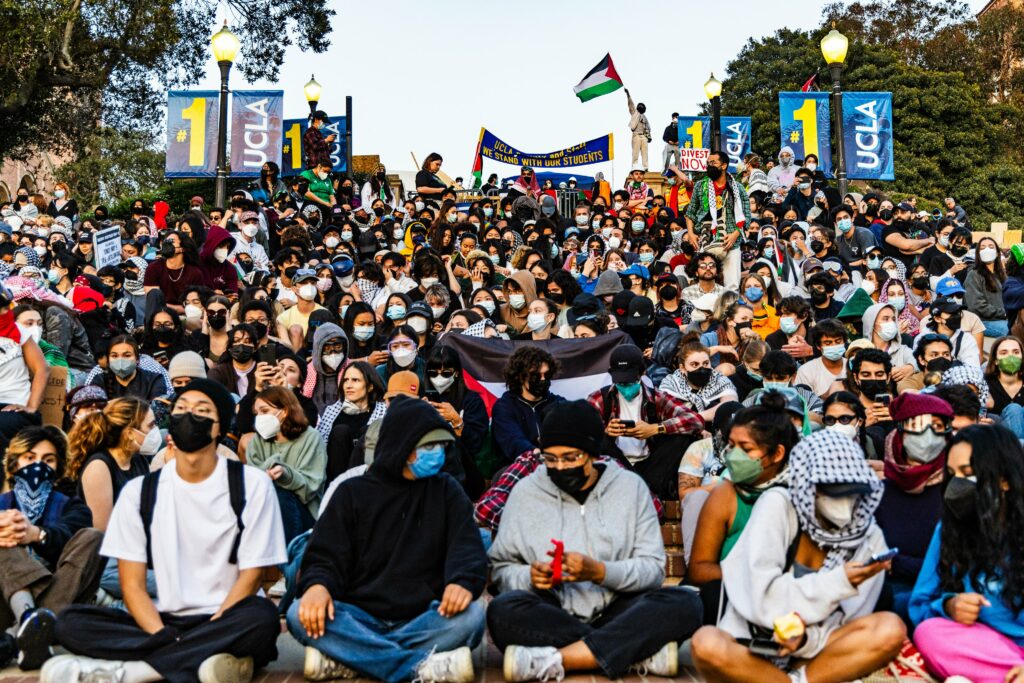
A man wearing a jacket that reads “Anti Genocide Social Club” records a livestream of a line of CHP officers between Royce Hall and Haines Hall on May 2, 2024.
Credit: Brandon Morquecho / Daily Bruin Photo Editor
This story has been updated
Police in full riot gear tore apart a large pro-Palestinian encampment on the UCLA campus early Thursday, one day after a violent attack on the student protesters by a group of counterprotesters. Police arrested over 200 and dispersed most of the protesters at the scene, according to the Los Angeles Times.
The “Palestine solidarity encampment” was set up a week ago, joining national student protests calling for universities to divest from companies with military ties to Israel and opposing the crackdown on student protesters nationwide.
The heavy police presence included a mix of officers from the Los Angeles Police Department, Los Angeles County Sheriff’s Department, California Highway Patrol and UC Police Department, according to multiple news sources.
Police said there was an absence of serious injuries, but the L.A. Times reported multiple cases of bloodied and hurt students requiring medical attention as officers made their way through the encampment.

As of late Wednesday night, hundreds of students remained gathered both inside and near the encampment. Students inside the encampment reportedly prepared for police to enter by fortifying the encampment with “makeshift walls” as police in riot gear began lining up near the encampment.
Some students were willing to be arrested or defend the encampment, with others expecting the police sweep to occur sometime after 1 a.m. Protesters were seen wearing hard helmets, goggles and respirators, according CalMatters, as they waited for police to take action.
Increasing numbers of police began arriving shortly after issuing the unlawful assembly order at 6 p.m. Wednesday, CBS News rteported. By around 10:30 p.m., police officers in riot gear began approaching one of the encampment’s barricaded entrances as a crowd of students chanted “Viva, viva Palestina,” or “Free, free Palestine” in Spanish.
In recent weeks, hundreds of university students and faculty have been arrested across the nation for setting up similar pro-Palestinian encampments.
Increasingly, faculty have spoken up about the campus leaders’ reliance on police to disperse student protests. Such decisions have been made by campus leaders at the University of Southern California, Columbia University, Cal Poly Humboldt, University of Texas Austin, Emory University and several other schools.
“What I found appalling is, to send armed riot police means you practically take into consideration that students might get harmed. So the university, again, kind of failed to protect its students,” said tenured professor of genocide studies Wolf Gruner in a recent Los Angeles Public Press interview.
Faculty have also joined some student encampments, such as Graeme Blair, UCLA associate professor of political science and a member of Faculty for Justice in Palestine.
In a text to the Daily Bruin, UCLA’s student paper, Blair confirmed that “professors inside the encampment ‘plan to be arrested alongside students who have done nothing but talk about a genocide taking place in Palestine.’”
He also stated: “I’m disgusted that after the university failed to protect students simply standing up for causes they believe from an anti-Palestinian mob that tonight they have chosen to endanger students once again by calling in the police. Any harm on students tonight is on them.”
In his comment, Blair referred to the violent events that unfolded at the UCLA campus between Tuesday night and into Wednesday morning when students within the encampment were attacked by around 100 counterdemonstrators supporting Israel.
The counterprotesters arrived on the campus around 10:30 p.m. Tuesday and within the hour began trying to tear down the barricades at the encampment, according to the Los Angeles Times.
The violence escalated within hours, as the pro-Israel protesters threw objects at the encampment and fireworks rained down. Fights also broke out when counterprotesters attempted to break the barricade. Students in the encampment also told the Times that they were hit by a substance they believed was pepper spray. Some people in the encampment were seen being treated for eye irritation, the Times reported.
During the altercation, journalists reporting for the Daily Bruin were also attacked. A group of four student reporters were verbally harassed, beaten, kicked and pepper sprayed. At least one of them went to the hospital and has since been released.
Police were slow to respond to the violence, according to multiple reporters at the site, which local, state, and federal leaders condemned.
One such person was Gov. Gavin Newsom, who commented on the events Wednesday morning on X, formerly Twitter: “I condemn the violence at UCLA last night. The law is clear: The right to free speech does not extend to inciting violence, vandalism, or lawlessness on campus. Those who engage in illegal behavior must be held accountable for their actions — including through criminal prosecution, suspension, or expulsion.”
The violence waned by around 3:45 a.m.
Hours later, University of California President Michael Drake ordered an investigation into how UCLA handled the violent demonstrations.
Following Wednesday’s violence, the president of the union representing UC’s non-senate faculty and librarians called for the resignation of UCLA Chancellor Gene Block.
“We call for the immediate resignation of Chancellor Gene Block for his failure of leadership. Chancellor Block has refused to meet with protestors to discuss their interests; instead he has created an environment that has escalated tensions and failed to take meaningful action to prevent the violence that occurred last night,” said Katie Rodger, president of the University Council-AFT in a joint statement with Jeff Freitas, president of the statewide California Federation of Teachers.






